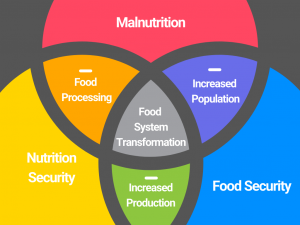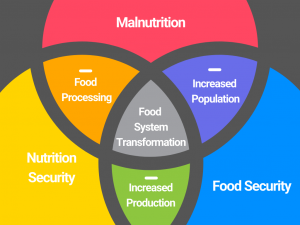Achieving Sustainable Development Goal (SDG) 2: Zero Hunger requires a multifaceted approach, including assessments and solutions for malnutrition, food security and nutrition security.Africa remains one of the most affected regions by malnutrition and, as a direct result, food and nutrition security. Most of the continent, 22 of the 34 countries, are affected by malnutrition, seven of these alone are in West Africa.
Located in West Africa, Nigeria is the most populous and largest economy in Africa. However, according to the Global Nutrition Report, Nigeria has the second largest population of “stunted” and “wasted” children in the world; 13.9 million and 3.4 million respectively. According to the 2021 SDGs Report, Nigeria ranks 160 out of the 165 countries regarding their progress towards achieving the SDGs. Specifically, the nation faces significant challenges with respect to SDG 2, with minimal progress made in reducing the prevalence of stunting and wasting among children under 5 years.
The country has high rates of food and nutrition insecurity, particularly in the northeastern region (e.g., Borno, Adamawa, and Yobe states). Studies and data compiled by the Food Security Cluster mention that certain areas in Nigeria remain inaccessible for assessment, primarily due to the Boko Haram insurgency. The lack of prevalent data on this critical issue highlights the need for further studies to provide relevant field information regarding food and nutrition.
In partnership with the Food Engineering and Sustainable Technologies (FEAST) Lab at the University of Missouri, the aim of this study was to (1) identify the challenges organizations face in addressing food and nutrition security issues in the region and (2) highlight existing approaches to addressing these challenges and recommend alternative approaches based on exchanges with field experts. We conducted seven interviews with experts working in agricultural, health, and environmental sectors in the region. Using a qualitative analysis approach, we synthesized both primary and secondary data to develop trends and recommendations. This report provides insights into the challenges and difficulties organizations and institutions face in addressing food and nutrition security in the region. Further, the report provides information on existing policies and strategies implemented by organizations to reduce the malnutrition effects in the region. Our findings also highlight the ways in which the insurgency by Boko Haram has impacted efforts in the region and proposes appropriate recommendations and solutions.
The full report will be available in 2022.
ADVISORS AND COLLABORATORS: Dr. Kiruba Krishnaswamy, Assistant Professor, University of Missouri
E4C 2021 PROGRAM MANAGEMENT TEAM: Mariela Machado, Senior Program Manager; Grace Burleson, Research Manager; Marilynn Holguín Clover, Program Coordinator; Jonathan Kemp, Program Associate
This research was completed as part of the 2021 E4C Fellowship program. Learn more about the Fellows who worked on this research collaboration by connecting with them on LinkedIn: Randolf Hackman, Joseph Bainamndi, and Khaoula Trigui.


No Comments.